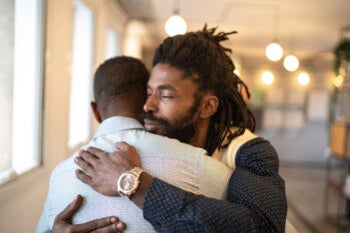Home / Health & Wellness Articles / Relationships /
Healing From End-of-Relationship Grief

The end of a relationship, whether a long-term partnership or a short-term fling, can cause a unique form of grief. While grief is typically associated with the concept of mourning a death, the emotional toll of a breakup can be just as intense and disorienting. Feelings of loss, confusion, and sadness may coexist, making it difficult to navigate this kind of heartache. Acknowledging and understanding the grief that comes with the end of a relationship is a vital step toward healing and rediscovering a sense of self.
After a relationship ends, the stages of grief can be similar to those experienced after the death of a loved one. Emma Finan, a Licensed Therapist at Centerstone, explains the concept of a grief rollercoaster, “The types of emotions we feel during grief will ebb and flow. One day you may feel like you’re starting to accept the end of your relationship and the next, you may experience a trigger that may cause you to feel sad or angry.” Common emotional responses to grief include shock and disbelief, longing, denial, anger, sadness, and loneliness. Some people may also experience strong physical sensations such as sleeplessness, loss of appetite, and fatigue. The best medicine for overcoming any type of grief is time and processing. “It’s important to be able to name and identify your emotions,” Finan adds. As you navigate this journey, remember that there is no time limit on grieving and that progress is progress.
There are different factors that can contribute to the grief you are experiencing. The length and type of relationship, the significance of it, the intensity of it, whether or not you had children, and your age can all contribute to the grieving experience. Studies have shown that, contrary to popular belief, gender does not impact the way we feel grief. While men and women may show emotions differently, we all experience grief.
During the breakup and grieving process, you may experience strong physical and emotional sensations, and it is best to allow yourself to feel them. Though for some, your instinct may tell you to run away from these feelings, they best way through it is to feel it. Finan recommends the following coping mechanisms:
- Keep moving forward with your daily routine. With the initial shock and potential anger or depression that can come with the end of a relationship, we are inclined to let our routine go. However, in order to keep some normalcy in your life, it may be helpful to continue your routine even if it looks different.
- Don’t make any radical or impulsive life changes right away. Due to all of the emotion that can be felt in these situations, there can be an instinct to act impulsively. This isn’t advised fresh after a breakup since you aren’t always in the clearest state of mind.
- Think of yourself. If your partner initiated the breakup, natural to wonder what that person is doing now. However, it’s important to focus on your own needs and take care of yourself.
- Talk to someone. Whether it’s a therapist or a friend, getting your emotions out is helpful.
After a relationship ends, there is potential to feel some guilt about why and how it ended, and the part you played in it. Finan recommends taking the time to reflect on your behaviors and what you can learn from the experience and how you can apply it moving forward. These reflection periods can happen most effectively in therapy with a professional who can help you reflect and determine your patterns to find a path forward.
The end of a relationship, no matter the reason, can be incredibly difficult and require time for healing. If you are grieving a relationship and need additional support as you process your emotions, Centerstone is here for you. Get connected with help and start healing today.


